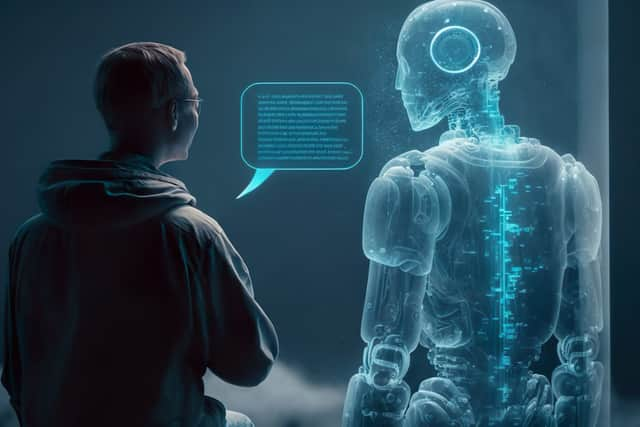White House AI fears: Google, Microsoft & OpenAI bosses summoned as Elon Musk calls for pause in development
The White House summoned tech bosses to a meeting on Thursday (May 4), with warnings they must protect the public from the dangers of Artificial Intelligence (AI). At the meeting were Sundar Pichai of Google, Satya Nadella of Microsoft and Sam Altmann of OpenAI who were all told they had a “moral” duty to put in safeguarding practices.
Officials at the White House made it clear to tech bosses they will put in further regulations on the software if needed. The public’s imagination has recently been captured by sites like ChatGPT and Bard, but a darker side to the software has already begun to show itself.
Advertisement
Hide AdAdvertisement
Hide AdThe software offers users the chance to interact with a system known as “generative AI” which can pull and summarise information from multiple sources within seconds. The software can also debug computer code, write presentations and create audio that sounds like it has been human-generated.
Elon Musk has also spoken out about his concerns around AI saying recently that “AI stresses me out” and called for a pause in development. The Twitter and SpaceX owner has put his name on a letter that suggests humanity faces “profound risks” due to the rate of advancement in the technology.
The open letter by the Future of Life Institute suggested that development should be paused worldwide until governments can figure out how the technology can be used and whether it should be regulated. The rollout of AI has sparked debates over the role of the software in society by offering examples of potential risks and rewards of the new technology.
Executives gathered at the White House where they were told that it was up to companies to “ensure the safety and security of their products”. They were also warned that the White House administration was open to new regulations and legislations that would cover artificial intelligence.
Advertisement
Hide AdAdvertisement
Hide AdChief executive of OpenAi, Sam Altman, which owns ChatGPT, told reporters that regarding regulation, the executives were “surprisingly on the same page on what needs to happen.” The US Vice President, Kamala Harris also released a statement following the meeting sharing how the new technology could pose a risk to the safety, privacy and civil rights of the public.
Harris said the private sector had “an ethical, moral and legal responsibility to ensure the safety and security of their products.” The White House also announced a $140m (£111m) investment from the National Science Foundation to launch seven AI research institutes.


The latest meeting follows calls from other tech bosses and politicians to better regulate AI. Earlier this week, Geoffrey Hinton, known as the “godfather” of AI, quit his job at Google, saying he now regretted his work.
Hinton told the BBC the dangers of AI chatbots were “quite scary”. Apple founder Steve Wozniak has also signed the letter to delay the rollout of AI technology, asking for a pause in development. The head of the Federal Trade Commission, Lina Khan penned an opinion piece in The New York Times on how and why the technology needs to be regulated.
Advertisement
Hide AdAdvertisement
Hide AdConcerns are rising around the dangers of AI, including how the technology could rapidly replace jobs as well as chatbots providing inaccurate information leading to a rise in misinformation. There are also concerns voice cloning AI could break copyright laws, as well as providing dangerous technology to predators who can replicate voices of children or parents.
Bill Gates, co-founder of Microsoft, has spoken out against calls for an AI “pause” saying the move would not “solve the challenges” ahead for the technology. Gates has argued it would be better to focus on how best to use the technology.
Comment Guidelines
National World encourages reader discussion on our stories. User feedback, insights and back-and-forth exchanges add a rich layer of context to reporting. Please review our Community Guidelines before commenting.
